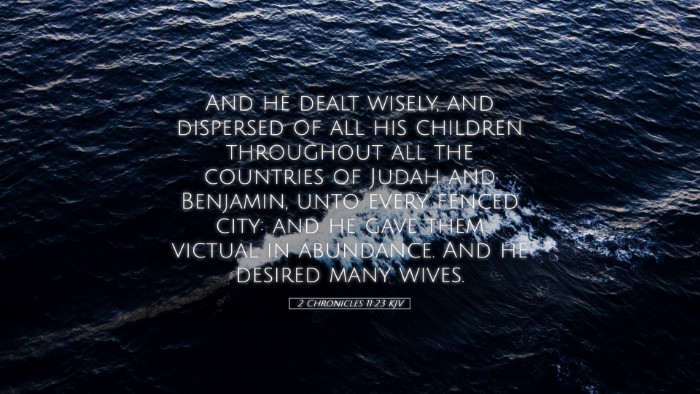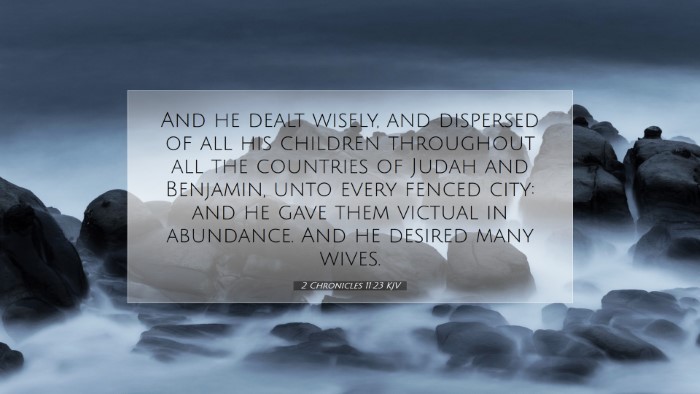Commentary on 2 Chronicles 11:23
Verse Context: 2 Chronicles 11:23 states, "And he dealt wisely, and dispersed of all his children throughout all the countries of Judah and Benjamin, and sent them to cities of Judah, and he gave them victuals in abundance, and he desired many wives." This verse reveals King Rehoboam's political strategy to secure his reign and the attempts to consolidate his power during a tumultuous period in Israel's history.
Historical Background
This scripture occurs within the narrative detailing the division of the kingdom after Solomon's reign. Rehoboam, facing a threat to his authority and unity of the kingdom, resorts to recruiting loyalty through familial ties and marriages, highlighting both the political nature of his actions and the sociocultural norms of the time.
Commentary Insights
-
Matthew Henry's Commentary
Matthew Henry emphasizes Rehoboam's wisdom in managing his children and strategically placing them in positions of influence throughout his kingdom. He notes that this arrangement was aimed at ensuring that the loyalists of Rehoboam had representation and power across Judah and Benjamin. Furthermore, Henry underscores the flawed nature of Rehoboam’s desire for many wives, indicating that this was more indicative of political ambition than of true marital fidelity or spiritual integrity.
-
Albert Barnes' Notes
Albert Barnes points out that Rehoboam's approach reflects human methods of governance, relying on alliances through marriage and geographical distribution of his progeny. He asserts that while this may be seen as wise from a secular standpoint, it also signifies a departure from reliance on God’s guidance. Barnes further considers the broader implications of Rehoboam's multiple marriages, connecting them to the eventual moral decay of the Israelite monarchy.
-
Adam Clarke's Commentary
Adam Clarke elaborates on the dynamics of Rehoboam’s actions, noting that the distribution of his children among the cities of Judah served to solidify his control and secure networks of loyalty. He comments on the social expectations of leaders employing marital alliances for political gain, contrasting this with a godly ruler who would depend on divine wisdom rather than political stratagems. Clarke emphasizes the potential dangers of such multiplicity in marriages and alliances, cautioning of the moral ramifications prevalent in scripture.
Theological Reflections
From a theological perspective, Rehoboam’s actions illustrate the human inclination to control and secure power through worldly means rather than faithfulness. This raises the question of how contemporary believers might seek security in their lives—are they leaning on the wisdom of God or the wisdom of man?
- The Pursuit of Security: The narrative invites leaders and congregants alike to reflect on their strategies for seeking security and favor. Are they depending on God’s guidance, or are they embracing worldly strategies similar to Rehoboam’s?
- The Nature of Wisdom: The contrast between divine wisdom and worldly wisdom is palpable. This invites further inquiry into the sources from which church leaders and Christians draw their decisions concerning family and governance today.
- Moral and Ethical Implications: The desire for many wives as indicated by Rehoboam opens a discourse on the implications of personal and political choices that deviate from God’s design for relationships.
Practical Applications
For pastors and leaders, this passage serves as a reminder of the importance of seeking divine wisdom as opposed to relying solely on personal or political strategy:
- Engage in Prayer: Constant prayer for wisdom is essential. Leaders are called to seek God's guidance in their decisions rather than relying solely on common practices.
- Foster Strong Relationships: Distributing power and influence must be done carefully to ensure accountability and the integrity of one’s family and leadership.
- Evaluate True Loyalty: Understanding where loyalty lies—with God or with human alliances—is crucial for church health. Pastors should encourage congregations to cultivate a loyalty influenced deeply by their commitment to Christ.
Conclusion
The narrative of Rehoboam in 2 Chronicles 11:23 serves not only as a historical account but also as a profound lesson in leadership, morality, and reliance upon God. It challenges contemporary leaders to reflect on their motivations and methods for securing influence, emphasizing the necessity of aligning one's actions with God’s righteousness. The explorations from Matthew Henry, Albert Barnes, and Adam Clarke resonate through the ages, reminding current readers of Scripture that triumph lies not in shrewd political maneuvers but in sincere devotion to divine guidance.


